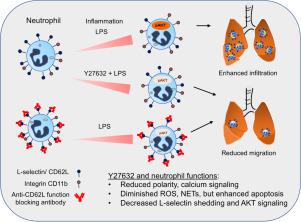Biochimica et Biophysica Acta (BBA) - Molecular Cell Research ( IF 4.6 ) Pub Date : 2021-08-21 , DOI: 10.1016/j.bbamcr.2021.119122 Apurwa Singhal 1 , Priyanka Dhankani 1 , Kanchan Lata Gupta 1 , Jayashree Mazumder 1 , Adithya R 1 , Madhu Dikshit 2 , Sachin Kumar 1

|
Neutrophils, the early responders of the immune system, eliminate intruders, but their over-activation can also instigate tissue damage leading to various autoimmune and inflammatory disease conditions. As approaches causing neutropenia are associated with immunodeficiency, targeting aberrant neutrophil infiltration offers an attractive strategy in neutrophil-centered diseases including acute lung injury. Rho GTPase family proteins Rho, Rac and Cdc42 play important role as regulators of chemotaxis in diverse systems. Rho inhibitors protected against lung injuries, while genetic Rho-deficiency exhibited neutrophil hyperactivity and exacerbated lung injury. These differential outcomes might be due to distinct effects on different cell types or activation/ inhibition of specific signaling pathways responsible for neutrophil polarity, migration and functions. In this study, we explored neutrophil centric effects of Rho signaling mitigation. Consistent with previous reports, Rho signaling inhibitor Y-27632 provided protection against acute lung injury, but without regulating LPS mediated systemic increase of neutrophils in the circulation. Interestingly, the adoptive transfer approach identified a specific defect in neutrophil migration capacity after Rho signaling mitigation. These defects were associated with loss of polarity and altered actin dynamics identified using time-lapse in vitro studies. Further analysis revealed a rescue of stimulation-dependent L-selectin shedding on neutrophils with Rho signaling inhibitor. Surprisingly, functional blocking of L-selectin (CD62L) led to defective recruitment of neutrophils into inflamed lungs. Further, single-cell level analyses identified MAPK signaling as downstream mechanism of Rho signaling and L-selectin mediated effects. p-AKT levels were diminished in detergent resistance membrane-associated signalosome upon Rho signaling inhibition and blockade of selectin. Moreover, inhibition of AKT signaling as well as selectin blocking led to defects in neutrophil polarity. Together, this study identified Rho-dependent distinct L-selectin and AKT signaling mediated regulation of neutrophil recruitment to inflamed lung tissue.
中文翻译:

Rho 信号抑制通过靶向中性粒细胞募集和选择素-AKT 信号减轻肺损伤
中性粒细胞是免疫系统的早期反应者,可以消灭入侵者,但它们的过度激活也会引起组织损伤,导致各种自身免疫和炎症疾病。由于引起中性粒细胞减少症的方法与免疫缺陷有关,针对异常中性粒细胞浸润为以中性粒细胞为中心的疾病(包括急性肺损伤)提供了一种有吸引力的策略。Rho GTPase 家族蛋白 Rho、Rac 和 Cdc42 在不同系统中作为趋化性调节剂发挥重要作用。Rho 抑制剂可防止肺损伤,而遗传性 Rho 缺陷表现出中性粒细胞过度活跃并加剧肺损伤。这些不同的结果可能是由于对不同细胞类型的不同影响或对负责中性粒细胞极性的特定信号通路的激活/抑制,迁移和功能。在这项研究中,我们探索了 Rho 信号缓解的中性粒细胞中心效应。与之前的报道一致,Rho 信号抑制剂 Y-27632 提供了针对急性肺损伤的保护,但没有调节 LPS 介导的循环中中性粒细胞的全身性增加。有趣的是,过继转移方法确定了 Rho 信号缓解后中性粒细胞迁移能力的特定缺陷。这些缺陷与使用延时体外研究确定的极性丧失和肌动蛋白动力学改变有关。进一步的分析揭示了用 Rho 信号抑制剂拯救中性粒细胞上的刺激依赖性 L-选择素脱落。令人惊讶的是,L-选择素 (CD62L) 的功能阻断导致中性粒细胞募集到发炎的肺部有缺陷。更远,单细胞水平分析将 MAPK 信号确定为 Rho 信号和 L-选择素介导效应的下游机制。在 Rho 信号传导抑制和选择素阻断后,去污剂抗性膜相关信号小体中的 p-AKT 水平降低。此外,AKT 信号传导的抑制以及选择素阻断导致中性粒细胞极性缺陷。总之,这项研究确定了 Rho 依赖性不同的 L-选择素和 AKT 信号介导的中性粒细胞募集到发炎肺组织的调节。AKT 信号的抑制以及选择素阻断导致中性粒细胞极性缺陷。总之,这项研究确定了 Rho 依赖性不同的 L-选择素和 AKT 信号介导的中性粒细胞募集到发炎肺组织的调节。AKT 信号的抑制以及选择素阻断导致中性粒细胞极性缺陷。总之,这项研究确定了 Rho 依赖性不同的 L-选择素和 AKT 信号介导的中性粒细胞募集到发炎肺组织的调节。











































 京公网安备 11010802027423号
京公网安备 11010802027423号